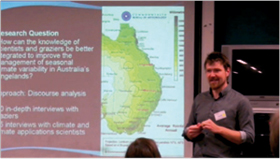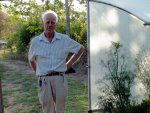

Início
Science Technology and Society conference
por Betsan MARTIN
Temas fortes ligados:
Meio ambiente e responsabilidade .
Temas largos ligados:
Indigenous peoples .
Environment .
Responsabilidade individual .
Research .
Scientists .
Sustainable development .
Science Technology and Society conference
Brisbane, Australia, Dec 2009
A Science Technology and Society conference brought an opportunity to activate new contacts for the Across Oceania network by preparing a presentation for the conference and visiting an ‘ecotechnology’ scientist, Callum Coats with whom we have been associated for many years. Callum is experimenting with using energy enhancing technologies, such as spirals inserted into water pipes, to test the beneficial effects for plant growth.
Callum Coats beside growing tunnel with energy enhancing technologies.
At the conference my presentation reflected some of the thinking and experience that emerged from the watersheds and Integrated governance assembly, on the science of water temperature as well as on the systems of governance required for ecosystem integrity. It is impossible to adequately relay the content of a three day conference on science, technology and society conference.
Contributions from Japan, Taiwan, India and from New Zealand meant that the conference connected us to very diverse contexts, but there was no representation from Pacific countries.
Themes ranged across stem cell research, nanotechnology and genetic engineering – which is strongly opposed by indigenous groups, energy technology and there were sustainability was a consistent theme. Strong critiques of development and the magnitude of poverty also brought some interesting approaches, such as ‘developing countries are part of the solution to the climate change crisis’ – of course these are the countries with much smaller carbon footprints. My interest was arrested by the challenge that we are too focused on the carbon aspect of unsustainability, and there are just as compelling concerns of nitrogen, of the acidification of oceans and the collapse of fisheries. With all the knowledge we have there is still very little being done on adaptation.
 Presentation on water policy in Australia
Presentation on water policy in Australia
The social ethos of science as a public good was considered to have given way to science as a market good – with the credibility of knowledge through peer review being replaced by the value of knowledge to corporate stakeholders – in other words, this is another angle on the commodificationand property rights inherent in knowledge though intellectual property rights and patenting. Indigenous contributors referred to the systemization of traditional knowledge through memorization and through people trained to be repositories of knowledge to ensure continuity of accumulated experience. At this conference, as in another conference on ethics and governance in New Zealand last week, there was interest is the models for governing the commons – oceans, fisheries, air, forests. This is an area we will do further research on for our interest in integrated governance.
Indigenous presentations echoed these interests and the tension that can be implicit in the recurring quest for responsibility and ‘hands on growing and gardening and safeguarding in local communities, along with the overwhelming scope of globalized systems. A novel term introduced by Ocean Mercier is ‘glocal’. Ocean a Maori academic working closely with our Across Oceania programme – she made a beautiful film which I will be sending to you all.
There were great meetings with people who we will invite to contribute to the responsibility and citizen assembly programme. One surprise was to discover a researcher, Tabatha Wallington who is working with an ethics of responsibility and the challenge of the duty of care in the management of natural resources. In situations of uncertainty about future consequences of decisions a knowledge-action gap is created. In the gap between the power to act and the capacity to predict consequences of actions and decisions, responsibility becomes an imperative. Tabatha’s research on ‘stakeholder’ involvement in resource management has identified responsibility as means to active engagement in the future., rather than the more passive method of ‘accountability’ – which does not directly address uncertainty and the limitations of knowledge.
We will share resources and make plans for collaboration. As I read the papers Tabatha has sent these can be shared amongst our networks.
Betsan



